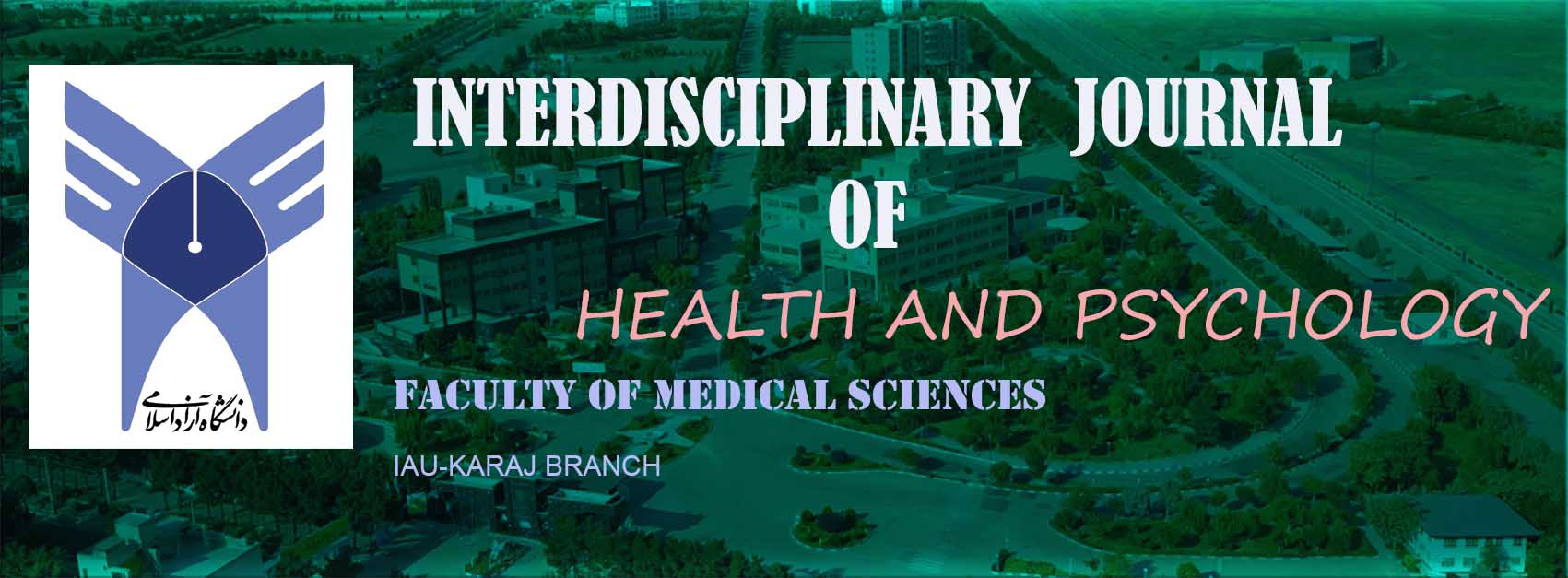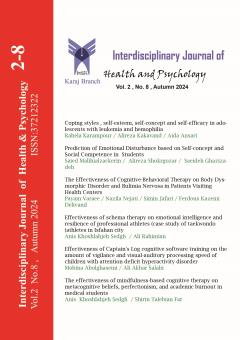Prediction of Emotional Disturbance based on Self-concept and Social Competence in Students Saied Malihialzhackerin / Alireza Shokrgozar / Saeideh Ghazizadeh
Subject Areas : Emotion Regulation
saied Malihialzackerini
1
![]() ,
Alireza Shokrgozar
2
,
Alireza Shokrgozar
2
![]()
1 - Academic Member and Journal Manager
2 - Assistant Professor - Faculty Member of Islamic Azad University, Karaj Branch
Keywords: Keywords: Emotional Distress, Self-Concept, Social Competence ,
Abstract :
Abstract The aim of the present study was to predict emotional distress based on self-concept and social competence in students. From a methodological perspective, the research is applied in nature and descriptive-correlational in terms of its research method. The statistical population included all female students of Islamic Azad University, Karaj Branch, in the fields of Management and Accounting, at associate, bachelor's, and postgraduate levels in the academic year 1403 (2024-2025). From this population, a sample of 200 students was selected using a cluster sampling method. To measure the variables under study, the Emotional Distress Questionnaire by Simons and Gaher, the Beck Self-Concept Inventory, and the Social Competence Questionnaire by Felner and colleagues were used. The findings of the study indicated that the emotional distress coefficient based on self-concept was significant at the alpha level of 0.05, with a positive correlation between emotional distress and self-concept. Additionally, all calculated correlation coefficients between emotional distress and social competence were significant at the alpha level of 0.05, with a negative correlation between them. The results suggest that negative self-concept significantly predicts higher emotional distress, while positive self-concept predicts lower emotional distress. Therefore, the first hypothesis of the research is confirmed. It is also concluded that social competence predicts emotional distress, thereby confirming the second hypothesis. Keywords: Emotional Distress, Self-Concept, Social Competence
منابع
احمدپور ترکی، زهرا؛ حکیم جوادی، منصور؛ سلطانی شال، رضا. (۱۳۹۷). تأثیر آموزش شایستگی هیجانی- اجتماعی بر پرخاشگری، حل مسئله، و خوشبینی دانش آموزان با پایگاه اجتماعی اقتصادی پایین. فصلنامه سلامت روان کودک، ۲ (۵)، ۱۰۷-۱۱۸.
رضاپورمیرصالح، یاسر؛ ریحانی، شهناز؛ خباز، محمود ؛ ابوترابی کاشانی، پریسا. (1389). مقایسه رابطه بین مولفه های ابراز گری هیجانی و خود پنداره در دانشجویان دختر و پسر. روان شناسی کاربردی، 4(1 (پیاپی 13))، 40-51.
عظیمی، عاطفه؛ امیدی، عبداله؛ شفیعی، الهام؛ و نادمی، آرش. (۱۳۹۶). اثربخشی درمان فراتشخیصی مبتنی بر تنظیم هیجانی بر ابعاد تنظیم هیجانی و سازگاری فردی و اجتماعی در دانشجویان دختر. مجله دانشگاه علوم پزشکی اراک (ره آورد دانش)، ۲۰(۱۰(۱۲۷) )، ۶۲-۷۳.شهید چمران اهواز.
غلامی، یوسف. (۱۳۸۴). بررسی مقایسه ای انگيزه پيشرفت و خودپنداره دانش آموزان پایه هشتم کشورهای مختلف با پيشرفت تحصيلی علوم آنان. مطالعه بين المللی ریاضيات و علوم، سومی.
فلاحت، عنایت الله؛ امینی، ناصر؛ آزادی، شهدخت. (1401). اثربخشی آموزش خودنظمدهی هیجانی بر شایستگی اجتماعی و ابرازگری هیجانی دانشآموزان پسر با نشانههای قلدری. فصلنامه پژوهشهای کاربردی روانشناختی، 13(3)، 243-260.
محبوبی، طاهر. (۱۳۹۸). اثربخشی آموزش شناختی ارتقاء امید بر آشفتگی روان شناختی دانشجویان دانشگاه پیام نور. شناخت اجتماعی، ۸(۱ (۱۵) )، ۵۱-۶۴.
همایی، فاطمه؛ خالقی پور، شهناز؛ خوش اخلاق، حسن. (۱۴۰۱). اثربخشی فنون سایکودراما برابرازگری هیجانی و شایستگی اجتماعی در نوجوانان مبتلا به اضطراب اجتماعی. فصلنامه علمی-پژوهشی سبک زندگی اسلامی با محوریت سلامت، ۶ (۳)، ۲۱۶۶-۲۳۲۲.
Refrence
Badan Firoz A, Makvand Hosseini S, Mohammadifar MA(2017). The relationship of emotion regulation with depression and anxiety symptoms of university students: The mediating Role of Mindfulness. Shenakht Journal of Psychology and Psychiatry; 4(2): 24-38.
Berking M, Wirtz CM, Svaidi J, Hofmann SG.(2014). Emotion regulation predicts symptoms of depression over five years. Behaviour Res Ther; 57: 13-20.
Butzer, B., and Kuiper, N. A. (2006). Relationships between the frequency of social comparisons and self-concept clarity, intolerance of uncertainty, anxiety, and depression. Personal. Individ. Differ. 41, 167–176.
Hwang S, White SF, Nolan ZT, Williams WC, Sinclair S, Blair RJ. Executive attention control and emotional responding in attentiondeficit/hyperactivity disorder—A functional MRI study. NeuroImage Clin. 2015; 9: 545-54.
Inzlicht M, Bartholow BD, Hirsh JB. Emotional foundations of cognitive control. Trends Cogn Sci. 2015; 19(3): 126-132.
Johnson, K., & Green, R. (2023). The role of self-concept and social functioning in emotional resilience among college students. College Student Journal, 57(1), 92-104.
Kim, H., & Lee, S. (2021). The impact of self-esteem and social skills on emotional disturbance in college students. International Journal of Mental Health and Addiction, 19(3), 633-646.
Lazarus, R. (1991). Cognition and motivation in emotion. Am Psychol 1991; 46:352–67.
Mantz LS, Bear GG, Yang C, Harris A. the Delaware social-emotional competency scale (DSECS-S): evidence of validity and Reliability. Child Indicators Research. 2018 ; 11(1): 137-157.
Miller, J. B., & Loughlin, S. (2022). Self-concept, social competence, and emotional well-being among university students: Exploring interrelationships and predictors. Journal of College Student Development, 63(2), 146-160 .
Simons, J. S., Gaher, R. M. (2005). The Distress Tolerance Scale: Development and Validation of a Self-Report Measure. Motiv Emot.
Smith, A., & Thompson, R. (2020). Social competence and self-concept as predictors of emotional disturbances in higher education students. Journal of Emotional and Behavioral Disorders, 28(4), 215-229.
Taşören, A. B. and Burhan, S. (2022). The Role of Emotional Distress in the Relationship between COVID-19 Burnout and Academic Burnout in University Students. Journal of Society Research, 19(46), 340-353.
Wong, A. E., Dirghangi, S. R., and Hart, S. R. (2019). Self-concept clarity mediates the effects of adverse childhood experiences on adult suicide behavior, depression, loneliness, perceived stress, and life distress. Self Identity 18, 247–266.

